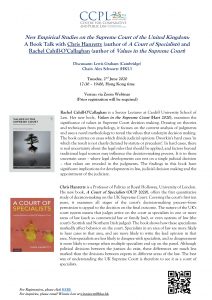New Empirical Studies on the Supreme Court of the United Kingdom:
A Book Talk with Chris Hanretty
(author of A Court of Specialists) and
Rachel Cahill-O’Callaghan
(author of Values in the Supreme Court)
Discussant: Lewis Graham (Cambridge)
Chair: Alex Schwartz (HKU)
Tuesday, 2nd June 2020
17:30 – 19:00 Hong Kong Time
Venue: via Zoom Meeting
(Prior registration will be required)
Rachel Cahill-O’Callaghan is a Senior Lecturer at Cardiff University School of Law. Her new book, Values in the Supreme Court (Hart 2020), examines the significance of values in Supreme Court decision making. Drawing on theories and techniques from psychology, it focuses on the content analysis of judgments and uses a novel methodology to reveal the values that underpin decision making. The book centres on cases which divide judicial opinion: Dworkin’s hard cases ‘in which the result is not clearly dictated by statute or precedent’. In hard cases, there is real uncertainty about the legal rules that should be applied, and factors beyond traditional legal sources may influence the decision-making process. It is in these uncertain cases – where legal developments can rest on a single judicial decision – that values are revealed in the judgments. The findings in this book have significant implications for developments in law, judicial decision making and the appointment of the judiciary.
Chris Hanretty is a Professor of Politics at Royal Holloway, University of London. His new book, A Court of Specialists (OUP 2020), offers the first quantitative study of decision-making on the UK Supreme Court. Covering the court’s first ten years, it examines all stages of the court’s decision-making process—from permission to appeal to the decision on the final outcome. The nature of the UK’s court system means that judges arrive on the court as specialists in one or more areas of law (such as commercial law or family law), or even systems of law (the court’s Scottish and Northern Irish judges). The book shows how these specialisms markedly affect behavior on the court. Specialists in an area of law are more likely to hear cases in that area, and are more likely to write the lead opinion in that area. Non-specialists are less likely to disagree with specialists, and so disagreement is more likely to emerge when multiple specialists end up on the panel. Although political divisions between the justices do exist, these differences are much less marked than the divisions between experts in different areas of the law. The best way of understanding the UK Supreme Court is therefore to see it as a court of specialists.
For Registration, please click HERE
For inquiries, please email Winnie Law at

